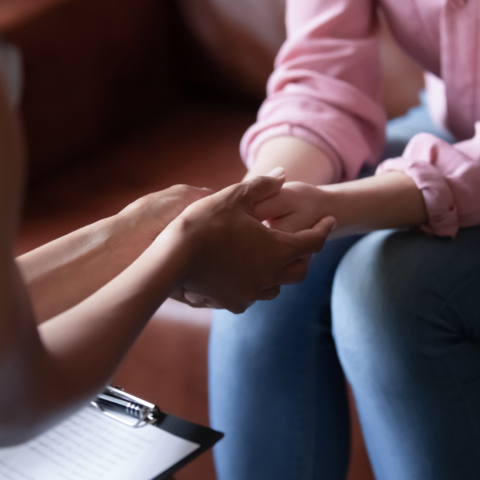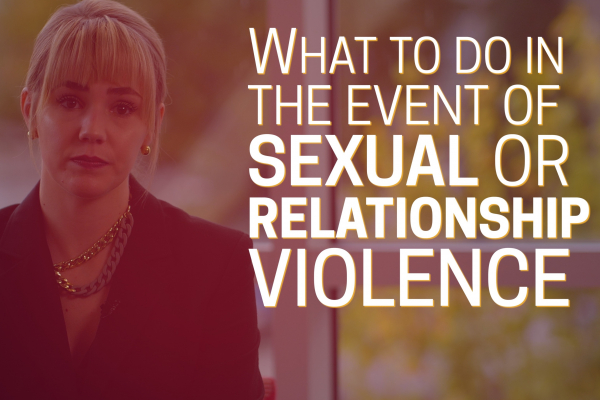
SAVE Program

College is a time of tremendous growth and opportunity, where our students not only gain invaluable life experience and education, but also create memories and friendships that last a lifetime.
But with these new experiences also come new challenges, and the risk of experiencing sexual assault, domestic violence, dating violence, or stalking.
In an effort to prevent these crimes from happening, the University of Charleston established the Sexual Awareness and Violence Education Program (SAVE).
SAVE is funded by the Department of Justice (DOJ) and the Office on Violence Against Women (OVW). through the Campus Program grant. The OVW Grants to Reduce Sexual Assault, Domestic Violence, Dating Violence, and Stalking on Campus Program was created by Congress in recognition of the unique issues and challenges that colleges and universities face in preventing and responding to sexual assault, domestic violence, dating violence, and stalking.
UC received its first OVW Campus Program grant in 2019 and received another 3 years of funding in 2022.
UC SAVE Program
A Coordinated Community Response team has been formed between members of Student Life, the Counseling Department, REACH (Rape Education Advocacy Counseling Healing), and members of the Charleston Police Department.
The SAVE Program has two main components: Awareness/Prevention and Support:
Sexual Assault and Relationship Violence Q&A | What Now?
Sexual Assault and relationship violence can not only be hard to talk about, but it can also lead to some difficult questions about potential prosecution and the criminal justice system. Morgan Switzer is an Assistant Prosecuting Attorney for Kanawha County and provides some guidance for sexual assault and relationship violence survivors wondering, “what now?”
What is Title IX and why is it important?
Title IX is a federal civil rights law that prohibits sex-based discrimination in any education program or activity receiving federal financial assistance. This includes ensuring equitable opportunities in areas like athletics, and actively addressing and preventing sexual harassment, sexual violence, and other forms of sex-based misconduct on campus.
- A campus climate survey will be conducted in year 2 of each grant cycle to further assess the needs of campus, as it relates to sexual assault, dating/domestic violence, stalking, and safety.
- An online training module Sexual Assault Prevention (Vector) will be disseminated and mandatory for all new and incoming students.
- An interactive workshop Bringing in the Bystander will be available to UC students and employees 2 times per year, in collaboration with community organization REACH.
- Bringing in the Bystander is an evidence-based prevention workshop that explores concepts such as victim blaming, rape culture, and consent.
- Participants learn the importance of speaking out against social norms that support a culture of sexual violence, are able to identify potential risks in a variety of situations, develop empathy and support for survivors, and explore how to safely interrupt or intervene in situations that could lead to sexual violence.
- Evidence has shown that Bringing in the Bystander is effective in shifting attitudes, cultivating senses of bystander responsibility, and likelihood of persons intervening.
- Bringing in the Bystander is an evidence-based prevention workshop that explores concepts such as victim blaming, rape culture, and consent.
- An in-person workshop on sexual assault, dating/domestic violence, and stalking, Sexual Awareness and Violence Education, will be provided to new students each fall semester.
- Awareness and prevention messages on consent, sexual assault, dating/domestic violence, and stalking will be disseminated throughout the year via social media, posters, pamphlets, etc.
- Documentary screenings and other events will also be offered to students and employees throughout the year.
Student Conduct
Student Conduct staff will receive increased training on sexual assault, dating/domestic violence, and stalking, as well as topics such as: relevant evidence and how it should be used during a proceeding, proper techniques for questioning witnesses, basic procedural rules for conducting a proceeding, avoiding actual and perceived conflicts of interest, how survivors respond to trauma, bias when responding to LGBTQ survivors, bias when responding to survivors of color, responding to male survivors, and responding to survivors with disabilities.
Campus Security
Campus Security will receive increased training on sexual assault, dating/domestic violence, and stalking, as well as topics such as: how survivors respond to trauma, trauma informed and survivor centered interview techniques, bias when responding to LGBTQ survivors, bias when responding to survivors of color, responding to male survivors, and responding to survivors with disabilities.
Additional security cameras were installed in the residence halls and parking garage to increase safety and security, and to help guide and assist in sexual assault, dating/domestic violence, and stalking investigations.
The University of Charleston, through partnership with REACH and the YWCA’s Resolve Program, will provide 24/7 hotlines, and confidential victim services for survivors of sexual assault, dating/domestic violence, and stalking.
REACH will provide a 24/7 crisis hotline, advocacy, accompaniment, and counseling for students and employees. These services include supporting the client by providing emotional support, making sure they know their rights and options, preparing and aiding them during tasks such as doctor’s appointments, medical exams, police interviews, court dates, and accessing a personal safety order. They can be reached by calling 304-340-3676 (ask for a REACH Advocate) or 1-800-656-HOPE. All services are free and confidential.
YWCA’s Resolve Program will provide a 24/7 crisis hotline, advocacy, counseling, and safety planning. They can be reached by calling 1-800-681-8663. All services are free and confidential.
Student Conduct
Student Conduct staff will receive increased training on sexual assault, dating/domestic violence, and stalking, as well as topics such as: relevant evidence and how it should be used during a proceeding, proper techniques for questioning witnesses, basic procedural rules for conducting a proceeding, avoiding actual and perceived conflicts of interest, how survivors respond to trauma, bias when responding to LGBTQ survivors, bias when responding to survivors of color, responding to male survivors, and responding to survivors with disabilities.
Campus Security
Campus Security will receive increased training on sexual assault, dating/domestic violence, and stalking, as well as topics such as: how survivors respond to trauma, trauma informed and survivor centered interview techniques, bias when responding to LGBTQ survivors, bias when responding to survivors of color, responding to male survivors, and responding to survivors with disabilities.
Additional security cameras will be installed in the residence halls to increase safety and security, and to help guide and assist in sexual assault, dating/domestic violence, and stalking investigations.
Students can contact Erin Dunmore at erindunmore@ucwv.edu or by calling/texting 304-590-2461 if they have any questions, need resources or referrals. Students can contact the Title IX Coordinator, Virginia Moore at titleix@ucwv.edu or call 304-357-4987.
For safety concerns or to request an escort while on campus, students can call campus security 304-357-4857 at any time. There are also emergency call buttons on campus, illuminated by blue lights.
Residential students can reach out to their RAs if they are having any issues on campus.
Currently, all students can access free counseling by contacting Rance Berry, the campus counselor at uc-counselor@ucwv.edu or by calling 304-357-4862.
Students and employees can contact REACH (Rape Education, Advocacy, Counseling and Healing) at 304-340-3676 or by using the 24-hour hotline at 1-800-656-HOPE. REACH not only provides counseling for survivors, but also advocacy and accompaniment. If someone needs support going to the hospital, police station, court dates, or doctors’ appointments, REACH can provide those services. They can also clearly explain a survivor’s rights and options and help them decide what to do next.
The YWCA’s Family Resolve Program is also a great resource for Charleston students and employees. They provide shelter and advocacy for survivors of dating and domestic violence and they can be reached 24 hours a day at 1-800-681-8663.
Beckley students and employees can contact any of the resources above, as well as the Women’s Resource Center at 1-888-825-7836.
Guides
Download the UC SAVE Survivor Guide
Download the UC SAVE Safer Sex Resource Guide
Download the UC SAVE Online Dating Resource Guide

Sexual Awareness & Violence Education Project Director
